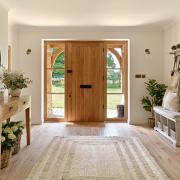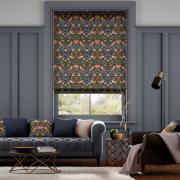With working from home so much more than a lifestyle choice, juggling a work life balance has its challenges – and depending on your set-up, where we seat ourselves is at the heart of the matter.
As George Clarke, architect, TV presenter and lecturer puts it: “In today’s evolving work landscape, the home office space has become a vital sanctuary for productivity.
“A well-designed space is not only about aesthetics, but one that is designed with productivity in mind,” highlights Clarke.
“The design process should combine style and functionality, setting the tone for enhanced performance and work ability.”
He continues. “The home office space is a powerful tool that can elevate our professional output; therefore its design should reflect that.”

The position of your desk really depends on the activity you’re carrying out – and your personal preference for what you want to see while sitting at your desk, says Clarke.
“For example, I have two desk positions at home. One is for when I’m sketching and drawing architectural plans, the other is when I’m sitting at a computer, writing, or editing photographs.
“My desk for sketching sits in the middle of my home office space, where I get a nice view out to my garden, getting lots of natural light.”
“As much natural light rather than artificial light is best for sketching and drawing,” explains Clarke.
And in his case: “It’s uniform north light which any designer or artist would prefer to direct, and strong sunlight from the south.”
Then there is my smaller desk area for my desktop computer, reveals Clarke. “This desk area is actually a section of worktop built in up against the wall.
“In many ways, it doesn’t really matter about the position of a desk like this as you’re often facing a big screen and facing a wall, but it’s still nice to get some kind out view left or right for your screen.”
Clarke says he can look out of his garden which gives a bit of relief from staring at a computer screen for hours.
“The desk being integrated against a wall provides all of your power points and data cable routes to link up with your computer, so it’s all very practical.”

How to make your small home work space productive
Everyone works differently, notes Clarke, but if your home work space is small then you should do the following…
Declutter: “Have as few things as possible in your space. Keep it really simple, and only have the things around you always need to do a day’s work.”
“Any other things you don’t need on a daily basis, store them elsewhere. The less clutter the more productive you will be.”
Avoid having took much paperwork: “This means fewer paperwork files in your home office and more information stored online.
“Online information takes up no space and files are often easier to find. So having all of your information stored on a cloud is more space efficient and more productive.”
Keep the space as calm as possible: “My office at home is incredibly quiet with very little in the way of distractions – and this definitely makes me more productive.”

How to best design your home office
With something as personal as a home office, the best way to ‘design’ it in an existing space is to basically measure the space out – and do some planning as to what will fit in where, suggests Clarke.
“Even doing a quick sketch or drawing will help you decide what works for you and what doesn’t. Take a few measurements of the space, get some graph paper and draw out the available space to scale.
“Then start sketching out a few options including everything from your actual desk, all the way through to shelving, stationary drawers or units,” adds Clarke.
If you’re bringing in a tradesperson such as a carpenter to build your new desk area, he says a simple sketch or drawing will help you communicate to them what you have in mind.
“They can then help you refine the design and get it 100% right.”
Furthermore, if you’re thinking of building an exterior office/small structure in your garden, Clarke says the opportunities are endless.
“There are some fantastic companies around that can design and build a new home garden office space for you, to your requirements.”


























